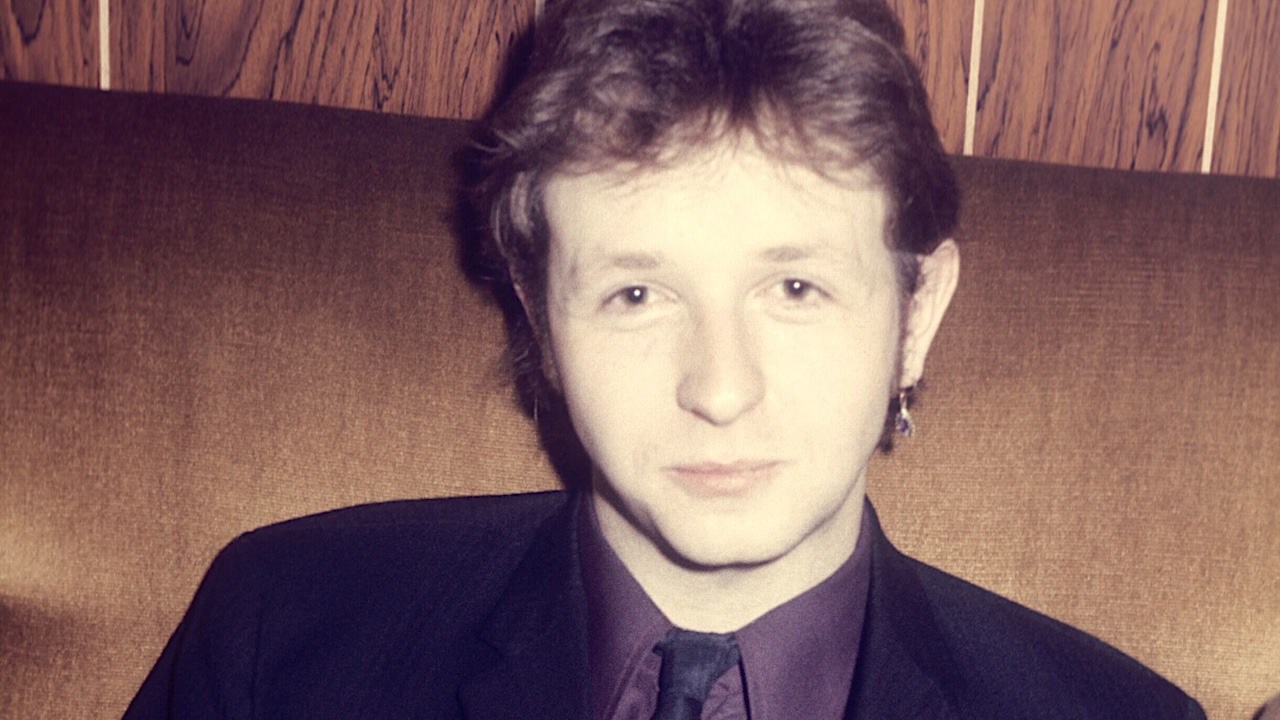“There was a real sense of excitement. We had a point to prove: this is the greatest rock’n’roll band in the world." How Iron Maiden went from East End outcasts to the world's most loved heavy metal band
Iron Maiden legends Bruce Dickinson and Steve Harris look back at 50 years of heavy metal history
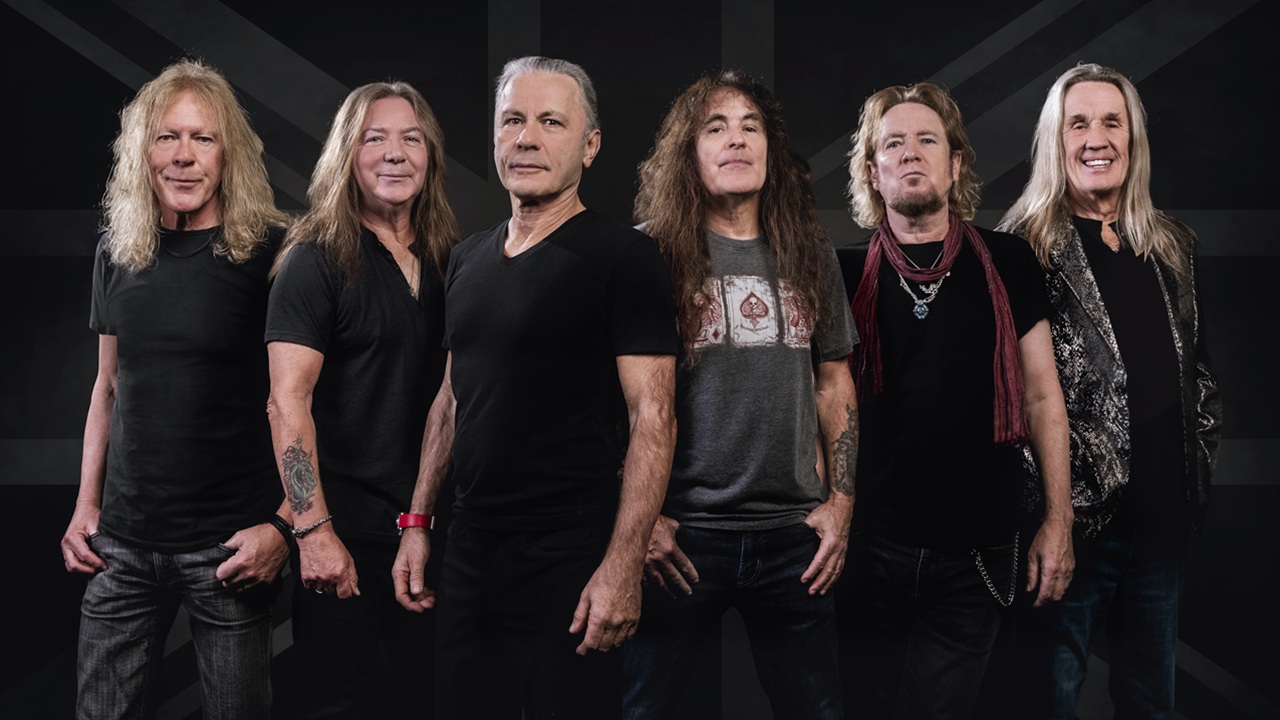
On June 9, 1976, Iron Maiden played the Cart And Horses pub in Stratford, East London. They’d formed 10 months earlier, in August 1975, though bassist Steve Harris hadn’t come up with the band name they’d adopt until Christmas Day that year. Since then, they’d rehearsed, rehearsed and rehearsed some more.
The Cart And Horses gig wasn’t actually their debut show. That had taken place on May 1 in St Nicholas’ Church in nearby Poplar on May 1, 1976. But the Cart And Horses was what Maiden’s bassist, founder and commander-in-chief calls their first “proper” gig.
“It was amazing,” says Steve now. “Literally within three or four gigs we had a following. We were doing things differently to other bands. We were playing a lot of original material. We had 11 original songs right from the beginning. You’d go to the pubs and see bands doing the same covers, because that’s what people wanted. We’d do covers of stuff that wasn’t well known. We never did what people wanted.”
On June 28, 2025, 49 years to the month after the show that fired the starting pistol on Maiden’s career, the band returned to Stratford. They were playing just a mile and a half from the Cart And Horses, but things were very different this time. This was Maiden’s biggest ever headlining show in the UK. The venue was the 80,000-capacity London Stadium, home of Steve’s beloved West Ham. And the line-up on that massive stage would have been unrecognisable to anyone who hadn’t seen them since that first show, with only the bassist remaining from that scorching hot summer.
In every other respect, Iron Maiden have hardly changed at all. Fire, energy, passion, stubbornness, a bone-deep refusal to march to anyone else’s drum – it’s all still there. This year they officially celebrate their 50th anniversary, with the ongoing celebrations including the heavy-on-the-classics Run For Your Lives tour, a lavish coffee table book (Iron Maiden: Infinite Dreams) and a forthcoming film due to arrive in cinemas in 2026.
“I don’t really pay much attention to anniversaries,” says Steve. “You don’t look backwards, you look forwards.”
That might be true, and for a band that have spent 50 years not doing what people wanted, things have worked out just fine for Iron Maiden.
Sign up below to get the latest from Metal Hammer, plus exclusive special offers, direct to your inbox!
"People say, ‘Were you nervous?’ I wasn’t nervous at all before the show, which I thought was a bit odd: ‘Why am I not getting nervous?’ It was talking to people at the gig, and the next day, that it hit me what had just happened. I don’t get that emotional, but it was a goosebumps-after-the-event type of thing.”
Steve Harris is talking about the London Stadium gig. By his own admission, he isn’t given to self-analysis or touchy-feely displays of emotion, even when he’s looking back on a career-highlight gig a stone’s throw from where he grew up. After a little prodding, he eventually offers a grudging smile. “The vibe and the crowd – it was a real magical thing,” he concedes.
It’s a couple of weeks after the London show, and we are sitting in the bowels of Paris’s La Défense Arena, in a small, chilly room with all the homely ambience of an office store cupboard. Steve is looking tanned and well. In contrast to the ceaseless energy he exudes onstage, he sits ramrod straight.
Maiden are due to play the second of two shows at this 45,000-capacity sports venue later tonight. They’re in a fairly exclusive club in that respect. There aren’t too many bands who have reached this level and actually stayed there this far into their career – The Rolling Stones and Paul McCartney for sure. Metallica if you want to fudge the timeframe by a decade. Even Black Sabbath had long lean periods when Ozzy was out of the band.
“Some bands don’t get to that stage at any point in their career,” says Steve. “There’s people I know who are fantastic musicians, they’ve been in bands for a long time, and they’re still playing pubs and clubs. So I feel lucky that we’ve been able to reach that level anyway.”
The new Maiden book does a fantastic job of charting their rise from the pub back rooms in 1970s London to the kind of arenas and football stadiums we’re currently sitting in. It’s an epic journey, but the real gold is in the sections on their formative years. Photos show Maiden’s early line-ups: first singer Paul Mario Day (sadly recently deceased) and his successor Dennis Wilcock, the latter with a Kiss-style star on his face, drawing a sword through his mouth.
Others will be familiar to Maiden archaeologists: Terry Rance, Dave Sullivan, Ron ‘Rebel’ Matthews, Bob Sawyer, Barry ‘Thunderstick’ Purkiss, Doug Sampson… all passed through early versions of the band, names forever inked into the Maiden history books. Even more enlightening are the diary entries Steve kept in the first few years, each written in his neat handwriting, usually noting the amount they got paid and the reaction they received.
“Audition gig at The Cart And Horses. Went down well,” reads the entry for June 9, 1976. “Received £5 expenses.” The money goes up: £10 for the next Cart And Horses gig, £15 for a show at The Bridge House in Canning Town. Some nights are great, others less so. “Worst gig yet – awful!” he seethes of a show at Sneakies Rock Club in Hounslow, in August 1976.
He’s still writing entries down as late as 1979, charting the coming and goings of various members and noting the £30 they’d get every time they played the now-legendary Ruskin Arms. Today, the bassist says he kept a diary for accounting purposes because “we didn’t have a manager”.
But it’s hard not to read them as a historical document written by somebody who knew he was going to be famous one day.
“No,” he insists, shaking his head. “We weren’t thinking like that back then. You’re just thinking, ‘What’s happening next week? Have I got a gig on Saturday night that hopefully means I’m going to miss a wedding?’”
Unlike other musicians he knew whose parents insisted they get a ‘proper’ job, Steve’s own mum and dad were supportive. “I never had those battles. Not that it would have made any difference, I would have done what I wanted to do anyway, as you do when you’re young.”
The only grief he ever had from his dad was over his hair. “He walked in one day and went, ‘You need a bit of a haircut, don’t you, boy?’ I went, ‘No I don’t.’ And he said, ‘Alright’, and left it at that. Never mentioned it again.”
Steve’s dad died young, at just 49, but his mum continued to come and see the band. “She really enjoyed it,” he says. “She stopped a few years ago. She’s nearly 90, she doesn’t go out to gigs much these days,” he adds drily.
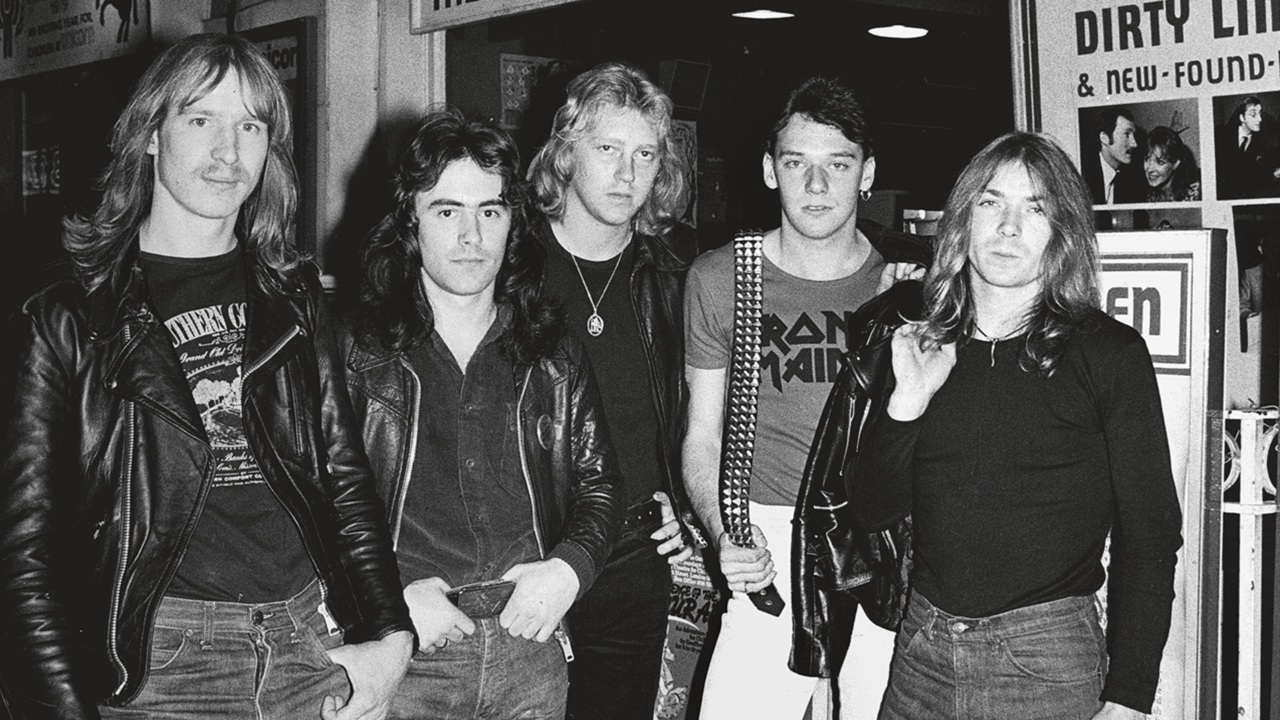
It took four years of hard slog before Iron Maiden finally signed a record deal with EMI. Even then, Steve Harris wasn’t sure what would come of it.
“I remember walking into the EMI office and thinking, ‘Are we actually going to be able to make a career out of this? Are we going to earn any money out of it?’” he says. “’Cos we were only on 30 quid a week or whatever it was.”
His fears seem daft now. Iron Maiden’s self-titled debut album, released in April 1980, entered the UK Top 10, a feat all but two of their studio albums have replicated (1981’s Killers and 1998’s Virtual XI are the outliers, reaching Nos. 12 and 16 respectively).
“But we didn’t think, ‘Right, now we’ve made it,’” he says. “We thought, ‘We’ve got to try and build it up so they don’t get rid of us after three albums.’”
The first two albums – Iron Maiden and Killers – both feature singer Paul Di’Anno, the charismatic leather-jacketed hooligan who gave Maiden a rough, punky edge.
“Paul was a loveable rogue,” says Steve of his ex-bandmate, who died in October 2024. “Paul was like Billy Liar – he used to tell so many porkies to everyone, including us. You couldn’t take what he said seriously. He was funny and we loved him in a weird way, even if he was a pain in the arse.”
Paul’s wayward lifestyle and lack of ambition led to his being fired by Steve Harris and Maiden manager Rod Smallwood in late 1981. He was replaced by Bruce Dickinson, formerly of NWOBHM footsoldiers Samson, whom Maiden had supported the year before.
The first album to feature Bruce was 1982’s The Number Of The Beast. “Yeah, that was a big one,” he says with customary understatement. “No. 1 album, we toured a lot. Until then, we’d been pouring all the money back into the band. We finally had enough to put down [a deposit] on a house.”
Of all the albums Iron Maiden made in the 1980s and early 1990s, 1983’s Piece Of Mind was Steve Harris’s favourite for a long time.
“And then [1988’s] Seventh Son Of A Seventh Son took over for a while,” he says. “And then we made [2006’s] A Matter Of Life And Death, which was a great album. “But I don’t think we’ve ever made the perfect album. Number Of The Beast, people think that’s the perfect album, but there are two songs on there that are not as good as the others,” he says, referring to Invaders and Gangland.
“Not everything’s going to be good, is it?”
In fairness, most of The Number Of The Beast is pretty good. “Well, yeah,” he says, allowing himself a smile. “But even if you take our worst album, and there’s always a debate about that, it’s a pretty good standard.”
Steve will never say which Maiden album he thinks is the worst. He’ll certainly go out to bat for the two often-maligned records they made with frontman Blaze Bayley, when Bruce stepped away from the band for four and a half years: 1995’s The X Factor and 1998’s Virtual XI.
“I said it at the time and I still believe it – those two are really strong, powerful albums and people will appreciate them later,” he says. “And people are going back and discovering them and realising they’re good.
“The X Factor in particular is really good, but it’s a dark album. Probably ’cos I was in a bit of a dark place with Bruce leaving and me going through a divorce at the time, all this stuff going on. But what came out of that was a powerful album. You take negative stuff and you turn it into a positive and those emotions come out, and that’s what you can do with music. Music’s such a powerful thing.”
Did he ever come close to knocking Maiden on the head?
“Only for a couple of hours,” he says. “It’s like when West Ham lose – I sulk for two hours, but you have to pick yourself up, brush yourself down and get on with it. It’s the only way it’s going to work.”
Maiden certainly picked themselves up and brushed themselves down. In 1999, they reunited with Bruce Dickinson and ex-guitarist Adrian Smith (who’d left in 1990), and released their 12th album, Brave New World, the following year.
“I’ll be honest, at the time I thought, ‘I don’t know how this is going to go,’” Steve admits of the reunion. “If they’d come back for the wrong reasons, it wouldn’t have lasted very long.”
It worked out alright, though, didn’t it? “It worked out alright, yeah,” he says. “When the six of us get together, there’s a magic that happens that you can’t put into words. The whole thing, it’s just very powerful.”
The last 25 years of Iron Maiden’s career haven’t been quite as wild as the first 25. Any rock’n’roll debauchery is a thing of the past, and there have been no meltdowns or public bust-ups. But it’s been wild in another way. The graph of Maiden’s success since the turn of the millennium has gone up and up.
They’ve always been massive in Europe, but North America – a continent that has sometimes had a take-it-or-leave-it attitude towards the band – has properly caught up. South America? Their stature there is off the scale. But has there ever been a point where Steve’s felt that Maiden are becoming redundant? That younger bands are doing a better job of it?
“We don’t think we’re redundant,” he fires back. “You might, but we don’t. If we think we’re redundant, we’ll stop. Why would you carry on if you did? Bottom line is we enjoy it. And people can see that. If you’re going out there and not enjoying it, they can see through it.”
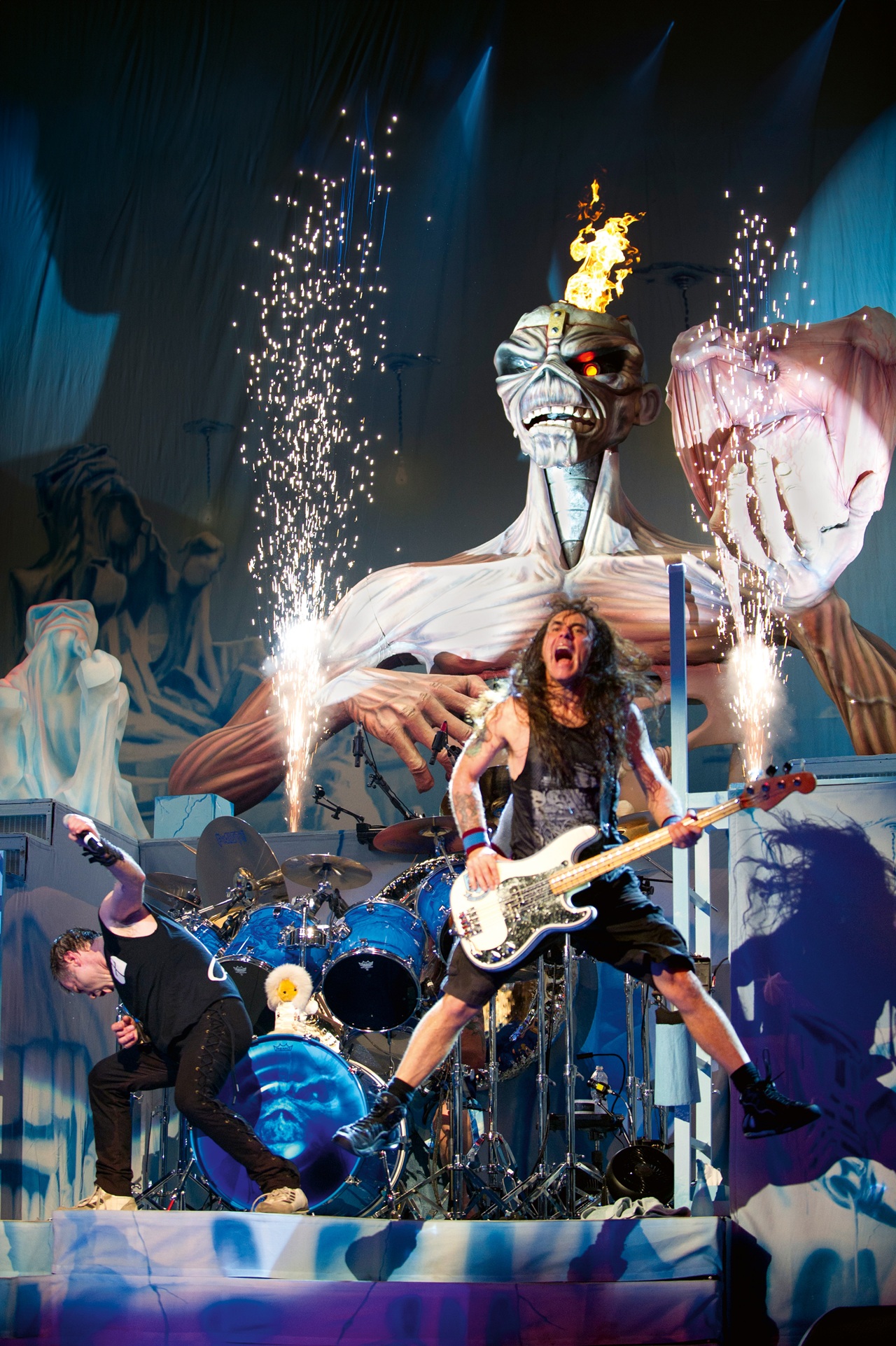
Bruce Dickinson can remember the song that convinced him to join Iron Maiden. “Killers,” he says, referring to the title track of the band’s second album. “It reminded me of discovering Deep Purple when I was 15 years old, except updated. It had the same energy. Everything was on the front edge, really pushing forwards.”
It’s 24 hours earlier. We’re sitting in the same unwelcoming room deep in the La Défense Arena. The frontman is wearing a beanie hat and t-shirt, the latter not quite disguising just how buff he looks these days. Bruce insists he isn’t normally given to looking back, but the Infinite Dreams book, the forthcoming film and Maiden’s 50th anniversary make it hard not to. Bruce has been in Maiden for 38 of those 50 years.
“It’s bizarre,” he says of the passage of time. “Thirty-five, 40 years ago seems like yesterday. You go, ‘Oh yeah, that was incredible… wait, it was how long ago?’ You do tend to knock off some of the rough edges and maybe not give them as much prominence as the other bits.”
Bruce goes on to explain how the best thing about those early days in the band was the sense of discovery.
“The first time you do something in your life isn’t always the best, but it’s certainly the most memorable,” he says. “You remember every tiny detail.”
He has fond memories of each of the first five albums he made with Iron Maiden. Here he is on The Number Of The Beast, his Maiden debut and the album that kicked them to another level: “We knew were onto something special. It was done fast - five weeks, start to finish. We were pinching ourselves, going, ‘Did we really just do Run To The Hills? Fuck!’ Then, ‘Wait, I’m in America? I’ve never been to America before! Fuck!’”
And here he is on 1983’s Piece Of Mind: “Decamping to Jersey in the middle of winter, all of us living together. There’s not a lot going on in Jersey, so we made our own fun. And then we go to the bloody Bahamas. We were partying and having fun and getting suntanned: ‘Are you kidding me?’
Powerslave? “‘Oh, what do we do now? Let’s go back to the Bahamas!’ And now we’re really cooking with gas. We’ve got platinum albums and everything. Then we go on tour for 13 months and lose our minds.”
On Somewhere In Time, the album that saw him take what he calls “a creative break” from songwriting (none of his songs appeared on the album): “I’m living in Amsterdam, above a whorehouse. Why? We had to live somewhere. There was a nightclub opposite, so I was in there every night and the girls would come in and chat about their customers.”
Seventh Son Of A Seventh Son: “Suddenly, we’re at Musicland Studios in Munich. This is where Rainbow did Rainbow Rising. Are you fucking kidding me?!’ And at the same time, I was living in a little bedsit I was renting in Bonn, ’cos I was fencing five days a week when I wasn’t singing.”
The point of this nostalgiadump is to illustrate what a wild, brilliant, thrilling ride it was being a member of Iron Maiden in the 1980s and early 1990s. Says Bruce: “All these things were happening. It was just mad.”
It was pretty wild being an Iron Maiden fan back then, too. Even in that golden age of heavy metal, Maiden inspired a passion that few other bands could match. It was like supporting a football team, except one that won every game. The funny thing is, it feels exactly the same now.
Many things have set Maiden apart from their contemporaries over the years: their music, their ambition, those fans, the fact they had the greatest mascot in history in the cadaverous form of Eddie. But possibly their greatest asset was the bull-headed stubbornness that they were in total control of their destiny throughout.
As Bruce puts it: “There was always a preparedness that if you were going to go down, you were going to go down on your own terms. We’re going to do our own thing and bugger the world.”
Maiden never went down, but it did look wobbly towards the end of Bruce’s first tenure in the band. 1990’s underpowered No Prayer For The Dying was the first time Maiden had made anything approaching a misstep. By 1992’s Fear Of The Dark, the singer already had one foot out of the door.
“I had this nagging feeling that it was a bit too easy, that we weren’t challenging ourselves,” says Bruce of that period. “I wasn’t unhappy. It was more, like, ‘Are we too comfortable? Do we need to be uncomfortable?’”
What happened next is well documented. Bruce left to pursue a solo career that began at right angles to Maiden, then gathered steam. He was replaced by Blaze Bayley for The X Factor and Virtual XI - not the greatest albums Iron Maiden have made, but certainly the greatest Iron Maiden albums they could have made at that point, and ones that were vital to the survival of the band.
But by the end of the decade, Blaze was gone and Bruce and Adrian were back in. There’s a great story in the new book about the summit meeting where the two parties decided to reunite. It happened in an office near Brighton Marina in the summer of 1999.
“Oh my god, it was fucking insane,” says Bruce now. “There were phone calls: ‘Turn up here at this time, and you wear a fedora hat and he’ll be wearing a carnation.’ I can only imagine what it’s like trying to get Trump, Putin and Zelenskyy in the same room, but it probably wasn’t as ridiculous as this.” In the end, the meeting lasted five minutes.
This is how the conversation went: Steve: “Why do you want to come back?”
Bruce: “Because I want to play big gigs again and I think we’ll be great.”
Steve: “Alright then.”
The best thing of all was that, having agreed to get back together, Maiden then decided to go to the pub next door, blissfully unconcerned that people might see them and put two and two together.
“Nah, fuck ’em,” says Bruce with a laugh. “I’m not worried about anything like that. Rod, on the other hand, would have freaked out.”
The album they came back with, 2000’s Brave New World, was one of the best of their career. “There was a real sense of excitement,” he says. “We had a point to prove: that this is the greatest fucking rock’n’roll band in the world, so let’s go out there and do it.”
And have you proved that point? “Oh, fuck yes.”
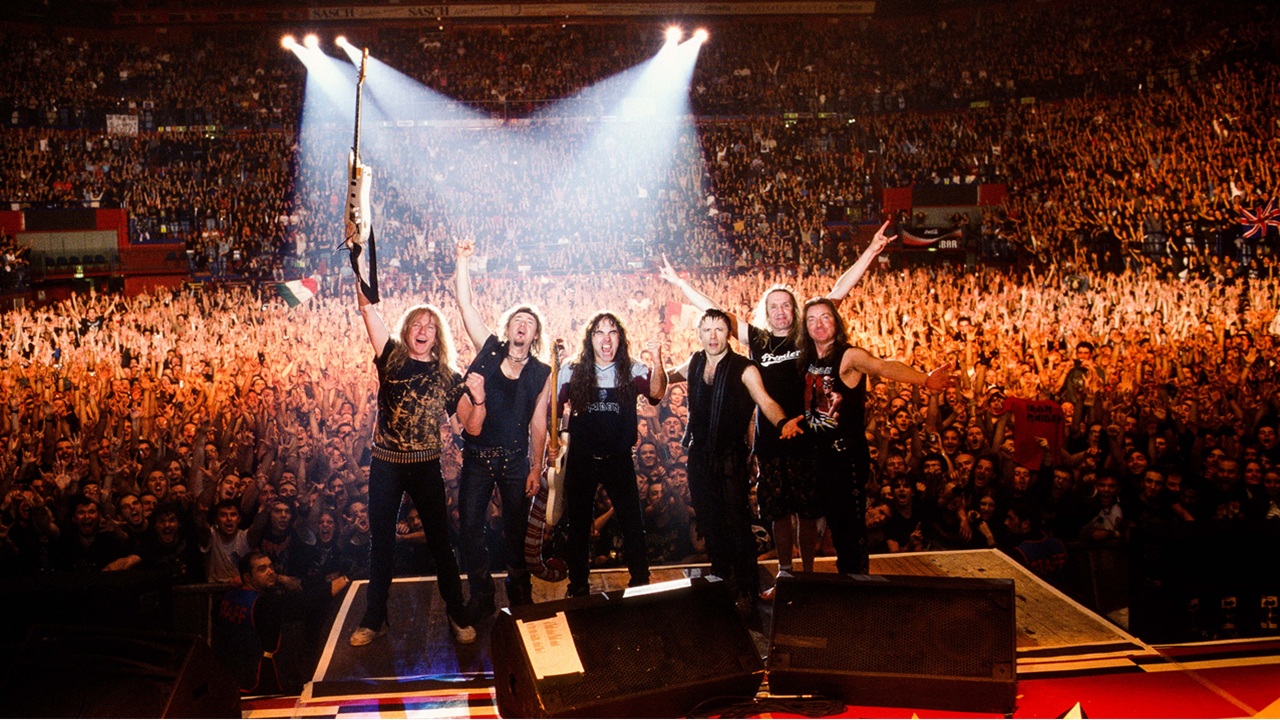
Most bands diminish over their lifetime. Maiden have got bigger. A show in front of 80,000 people in East London 50 years after they started is proof of that. Bruce says he’s never given much thought as to why that’s happened, and then, in typical Bruce Dickinson fashion, begins to think about it.
“I suppose it’s because we’ve consistently refused to do anything which doesn’t deviate from our identity for the sake of five minutes of fame here, five minutes of fame there. We’ve never done that. And that carries a lot of currency, especially now, when people are bombarded with narcissism sans talent.
“But Maiden have never been that. I hate using woke terms, but inclusivity has been a Maiden thing before inclusivity was even a thing. Maiden’s music transcends cultures. There is a purity and honesty to it. There’s always been a certain amount of derision and jealousy from people who decry us: ‘Oh, it’s just fantasy, it’s just escapism, it’s just entertainment. As if that’s some kind of crime, to entertain people."
He’s on a roll now… “You know what? A lot of people have shitty lives. They’re stuck in a shit job, or relationships have folded up on them, or any other of a variety of reasons. And Maiden give them some solace. It gives them something to hang on to. For some people it’s a lifeboat.
“But for people who love Maiden, it really does help them to come into our world. Yes, we sing songs about monsters and the dark side of things, but we sing uplifting songs, we sing about history and achievements. There’s quite a strong morality in our songs – things like loyalty, truth, self-sacrifice and willingness to fight in the face of oppression. Everything Glastonbury isn’t,” he adds, unable to resist a dig.
If it wasn’t clear, Bruce Dickinson isn’t a fan of Glastonbury. In fairness, Glastonbury isn’t a fan of Iron Maiden either, given the fact that they’ve never asked the band to play. “Of course they haven’t,” says Bruce. “And I hope they never bloody do.”
That antipathy towards the mainstream establishment is well-documented, and it extends to awards ceremonies in general, such as the Brits, the Grammys, The Rock And Roll Hall Of Fame, the whole dog and pony show. Asking him about them at this point feels a little hackneyed – it’s like dangling a piece of string in front of a cat: he can’t resist taking a swipe.
“They don’t understand this music,” he says. “I mean, look at some of the wankers they’ve inducted into the Rock And Roll Hall Of Fame. Your reputation isn’t based on committees that give you little bits of metal or some silly institution invented by Americans because they love that sort of thing. Your reputation is based on what you do and how your audience reacts to it. It’s that simple.”
And so here we are, 50 years into Iron Maiden’s career, and they show no signs of slowing down. “One day we will stop,” says Bruce Dickinson. “But we don’t know when, we don’t know where.” He grins wolfishly. “And even if we did, we wouldn’t tell you.”
As if to prove his seemingly inexhaustible levels of energy, the singer plans to begin his new solo album in January. “Dave Grohl’s studio is booked,” he says. “Some of it is very heavy.”
A new Maiden album is a different matter. Bruce gently raised the idea with Steve not long ago. “I said, ‘The drummer [Simon Dawson, who replaced longtime sticksman Nicko McBrain in 2024] is doing a pretty good job, isn’t he? Maybe we should do a new album.’ He went [makes distracted grumbling noise] ‘I haven’t got time.’”
“I dunno, is the answer to that,” says Steve Harris when the question of a new album is put to him. “Writing is stressful. I lock myself away and torture myself for a few weeks. I wouldn’t say it’s traumatic, but it’s a hell of a lot of work.”
Not that work is something he’s scared of. The day after Maiden finish this leg of the Run For Your Lives tour, he’ll be back onstage with his other band, British Lion, at the 330-capacity Booking Hall in Dover, Kent, then off to Europe. In December, he’s back in his old stomping ground of Stratford, once again with British Lion. The venue this time? The Cart And Horses, the place where it all kicked off for Iron Maiden nearly 50 years ago.
“What I’m proudest about,” he says of Maiden, “is being a bloody good live band. If they write an epitaph, that’s what I want it to say: ‘A bloody good live band.’”
And Bruce Dickinson? After nearly four decades in Iron Maiden, what is he proudest of? “I’m still alive,” he says with a grin. “We’re still here, we’re still doing it and we’re still doing it well.”
Iron Maiden: Infinite Dreams is out now via Thames & Hudson. The Run For Your Lives World Tour resumes in 2026. For the full list of upcoming dates, visit their official website.
Dave Everley has been writing about and occasionally humming along to music since the early 90s. During that time, he has been Deputy Editor on Kerrang! and Classic Rock, Associate Editor on Q magazine and staff writer/tea boy on Raw, not necessarily in that order. He has written for Metal Hammer, Louder, Prog, the Observer, Select, Mojo, the Evening Standard and the totally legendary Ultrakill. He is still waiting for Billy Gibbons to send him a bottle of hot sauce he was promised several years ago.
You must confirm your public display name before commenting
Please logout and then login again, you will then be prompted to enter your display name.





